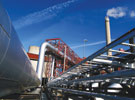

Traditionally, a process control system was either a distributed control system (DCS), or a PLC/scada, each with its own strengths and weaknesses. As part of its integrated architecture, Rockwell Automation offers another innovation that combines the benefits of both in a single, scalable solution. Not only does PlantPAx integrate with process field device instruments, it also has tight integration with motor control equipment to improve system performance.
The PlantPAx Process Automation System combines the systems approach of a DCS with the flexibility of a PLC for a system that is ideal for multiple applications, including process, batch, drives, motion and safety. “PlantPAx fits in perfectly with our integrated architecture approach as it covers a range of disciplines, including continuous process, batch process, discrete control, motion and drive control, machine and process safety,” explains Sean Homan, business manager control systems, Rockwell Automation.
DCS at a glance
The key benefit of a DCS system is that suppliers took a ‘systems approach’ and the control system was designed for large scale applications. Much of the hard work of integrating different parts of the system was taken care of by the DCS vendor by using a single database. With the DCS approach, the system is configured using standard control objects that are automatically linked to the appropriate faceplate, simplifying configuration and leading to standardisation. There are, however, a number of shortcomings.
Many applications have a large number of packaged equipment (OEM packages) from different suppliers that need to be integrated. If the packaged equipment comes with a PLC, there are two different control systems on-site which increases the overall cost. Often it will be impractical to integrate the control elements of packaged equipment directly into the DCS. It will also be difficult for the package supplier to test the equipment or provide process guarantees unless they provide the control system. With the trend to build process plants more modularly, these issues become more pronounced. In addition, DCSs have traditionally been expensive to support through the lifecycle because of significant annual licensing and other costs.
The lowdown on PLC/Scada
Originally developed for discrete applications, PLCs now cover a wide range of applications. The term programmable automation controller (PAC) is used to describe many products distinguishing them from older systems that were focused on discrete logic. This approach is very flexible – multiple programming languages, open communications, scalable for different applications.
There are many systems integrators with specific industry or application knowledge that can integrate PLC/PAC technology; this approach is also ideal for OEMs who can select cost-effective products to meet their requirements. The flexibility and power of PLC/PAC solutions, as well as off-the-shelf availability, has made them the product of choice for many end users.
Although PLCs and PACs have become more powerful, there are a number of features that are missing when compared to a DCS – users often have to configure the PLC and scada system databases separately. Another potential weakness is that not all PLCs have the features required for highly demanding continuous process control applications.
Process optimisation and asset management is another area where traditional PLCs may be lacking when compared to a DCS, which typically offer tools to optimise control loops and more advanced alternatives to PID control to improve performance. Also, traditional PLCs may be lacking the features required to maximise the benefits of smart field devices and asset management packages.
PlantPAx in perspective
At its core, PlantPAx is a single database that also has a single security model to simplify the management of user profiles. In addition, any data created in the system is instantly accessible to all the software modules that need it. PlantPAx is also scalable from small OEM packages with less than 100 I/O points, to a large scale distributed system with multiple controllers, hundreds of control loops and more than 10 000 I/O.
Says Homan: “All the systems use the same instructions, communications networks and visualisation development platform. This allows users to select one architecture for the plant, scale up from pilot to full scale production using the same architecture and build a modular plant that incorporates packaged equipment using PlantPAx.”
Asset management options allow users to manage configurations, implement backup regimes, track user action, configure field instruments and alert them to potential problems. PlantPAx supports open FDT/DTM technology to provide asset management for a wide range of instruments connected on HART, Profibus or Foundation Fieldbus. It also supports direct connection to the latest generation of instruments from Endress+Hauser and others on Ethernet/IP.
“PlantPAx systems can be engineered by end users, systems integrators, OEMs or our Solutions and Services Business (SSB) systems group. A large network of SIs worldwide can provide PlantPAx solutions tailored to a client’s individual requirements,” concludes Homan.
For more information contact Sean Homan, Rockwell Automation, +27 (0)11 654 9700, [email protected], www.rockwellautomation.co.za
| Tel: | +27 11 548 9960 |
| Email: | [email protected] |
| www: | www.profiafrica.co.za |
| Articles: | More information and articles about PI SA (PROFIBUS & PROFINET SA) |
| Tel: | +27 11 998 1000 |
| Email: | [email protected] |
| www: | www.rockwellautomation.co.za |
| Articles: | More information and articles about Rockwell Automation |

© Technews Publishing (Pty) Ltd | All Rights Reserved